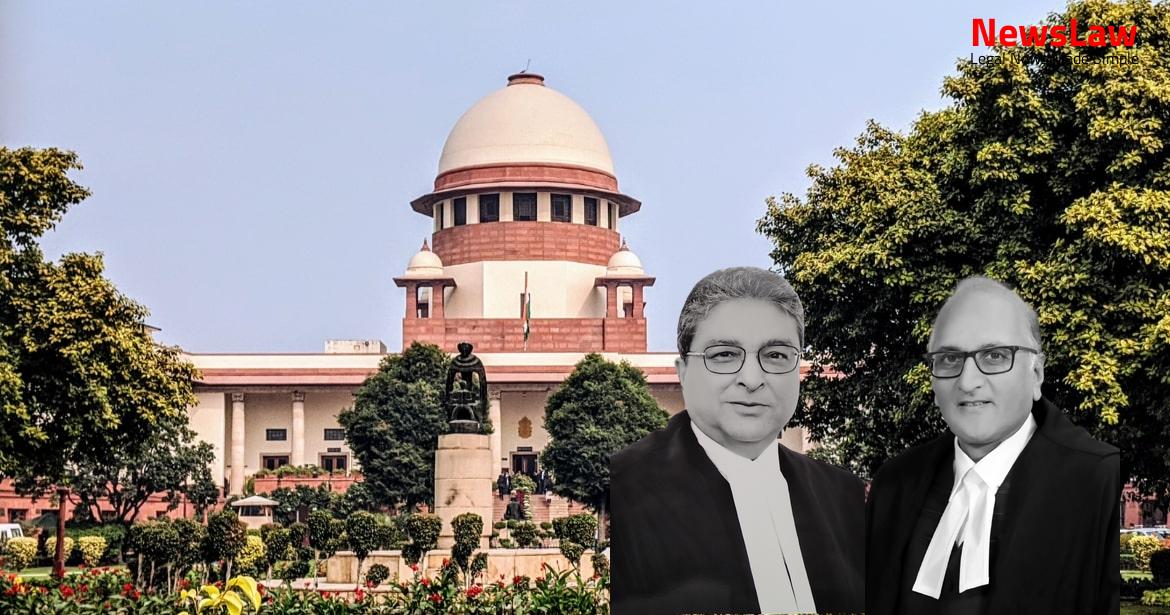In a significant ruling by the Supreme Court of India, the judgment in the case of Original Name v. State emphasizes the importance of balancing equity in commercial contracts. This case sheds light on the complexities of bid mistakes, contractual obligations, and the application of principles like proportionality and reasonableness. It explores the unique circumstances where courts may intervene to ensure fairness and equity in contractual disputes.
Facts
- Appellant entered a bid of 140.10% instead of the intended 104.10%
- Appellant sought rectification of the bid mistake through emails and calls
- The request for bid rectification was rejected by the first respondent due to the e-auction process being completed
- Appellant had complied with the necessary requirements of the e-auction process
- The last bid recorded was of the appellant at 140.10%
- The appellant enhanced the bid 47 times out of 137 attempts during the bidding.
- An error occurred when the appellant tried to enhance the bid by 0.05% but mistakenly entered 140.10% instead of 104.10% due to a human error.
- The High Court dismissed the writ petition of the appellant, stating that once a bid of 140.10% was made, it cannot be considered a mistake later on.
- The appellant argued that the bid of 140.10% was a bona fide mistake and sought for the e-auction process to be re-commenced.
- The High Court concluded that the appellant was bound by their bid of 140.10% and that the jurisdiction of the court did not allow intervention in such disputes, leading to the dismissal of the writ petition.
- The appellant disagreed with the High Court’s judgment and challenged it in the present appeal.
Also Read: Manmohan Nanda vs United India Insurance Co. Ltd. – Insurance Claim Dispute
Arguments
- The appellant complied with the formality according to the respondents.
- The bid of 140.10% cannot be claimed as a mistake by the appellant.
- Bidders have to authenticate bids with a Digital Signature Certificate on the e-auction platform.
- The e-auction process had attained finality according to the respondents.
- The appellant cannot reopen the e-auction process for claiming a mistake.
Also Read: Legal Analysis on Transferability of Contractual Obligations
Analysis
- Court emphasizes the need for restraint in judicial review of contractual or commercial matters.
- Appellant’s mistake in bid submission due to system limitations and inability to rectify.
- Appellant promptly notified authorities upon discovering the mistake.
- Application of doctrine of non-traverse in absence of specific denial by respondents.
- Forfeiture of security deposit disproportionate to the error committed.
- Balancing the interests of both parties crucial in judicial review of tenders.
- Consideration of the doctrine of proportionality in the context of the case.
- System constraints prevented bid rectification, leading to appellant’s predicament.
- Bona fide intent of appellant to rectify error evident from timely communication.
- MA Rules lack provisions for bid withdrawal or rectification, leading to appellant’s dilemma.
- Emphasis on principles of proportionality, reasonableness, and equity in addressing the appellant’s grievance.
- Courts rarely interfere in contractual matters unless arbitrariness, bias, or irrationality is evident.
- Equitable relief can be sought in cases of mistakes made in bids, but prompt action must be taken to rectify the mistake.
- The doctrine of proportionality involves balancing and necessity tests to ensure fairness in decision-making.
- Negligent mistakes in bid documents cannot be corrected based on equity if prompt action is not taken to rectify the mistake.
- The case being discussed has unique features that distinguish it from a previous case, highlighting the need to consider the specifics of each situation.
- The principle of proportionality requires decision-makers to prioritize their actions and arrive at fair decisions without abuse of discretion.
- Government departments are expected to treat citizens fairly and with full personal consideration, without unfairness or arbitrariness.
- Proportionality involves scrutinizing excessive penalties and ensuring that any infringement of rights is the least restrictive alternative.
- The court refrained from deciding whether the forfeiture of the security deposit of Rs. 9,12,21,315 was a penalty or liquidated damages
- The court invoked Article 142 of the Constitution to pass necessary orders in the interest of equity
- The impugned communication by the first respondent was quashed by the court
- The court confirmed the liberty of the respondents to conduct a fresh e-auction if not already done, due to a human error that showcased remiss and carelessness
- The court aimed to maintain a balance between the State’s interest and the private party’s by not letting the appellant go scot-free
Also Read: Court’s Legal Analysis on Specific Performance in Tribal Land Transfer Case
Decision
- The impugned judgment and order is set aside.
- The appellant is directed to pay Rs 3,00,00,000/- to Original Name within a month.
- Additional Rs.25,00,000/- to be spent on charitable purposes for tribal development.
- In case of default, the bank guarantee provided by the appellant can be encashed.
- Original Name has the liberty to conduct a fresh e-auction as per the law.
- If the payment is made within the stipulated time, the bank guarantee will be cancelled.
- Out of the payment, Rs.2,75,00,000/- will be appropriated towards various costs and losses incurred due to the delay.
Case Title: M/S OMSAIRAM STEELS AND ALLOYS PVT. LTD. Vs. DIRECTOR OF MINES AND GEOLOGY,BBSR (2024 INSC 520)
Case Number: SLP(C) No.-006920 – 2023



